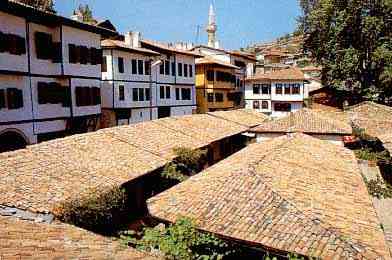

SAFRANBOLU
 The
known history of Safranbolu, located near the north western coast of Anatolia
,dates back as far as 3000 BC. Once
a city of Roman Province of "Paphlagonia" Safranbolu has hosted
many civilizations including the Roman, Byzantine
Seljuk and Ottoman Empires throughout its history. During the Ottoman era the town
served as an important junction on
the Kastamonu-Gerede-Istanbul route of the famous silk road. Safranbolu was at
the same time a popular residence for
Ottoman Royalty close to the Sultan and Grand Vezirs. The
city received its name from the saffron which is native in Safranbolu. The
powder obtained from its flower is a very strong
dye. Used in very small quantities,
The
known history of Safranbolu, located near the north western coast of Anatolia
,dates back as far as 3000 BC. Once
a city of Roman Province of "Paphlagonia" Safranbolu has hosted
many civilizations including the Roman, Byzantine
Seljuk and Ottoman Empires throughout its history. During the Ottoman era the town
served as an important junction on
the Kastamonu-Gerede-Istanbul route of the famous silk road. Safranbolu was at
the same time a popular residence for
Ottoman Royalty close to the Sultan and Grand Vezirs. The
city received its name from the saffron which is native in Safranbolu. The
powder obtained from its flower is a very strong
dye. Used in very small quantities,
Saffron adds a delicate flavor, distinct aroma and a very unique color to deserts and other food. Also unique in Safranbolu is the famous Çavus grapes with its extremely thin skin and sweet flavor.
Architecture
of Safranbolu 
Safranbolu displays its extremely rich historical and cultural heritage through 1008 architectural structures all preserved in their original environment. These structures include the public buildings such as Cinci Hodga Kervansaray and Cinci Hodga Hammam, Mosques of Koprulu Mehmet and Izzet Mehmet Pashas, The Tanneries Clock tower, Old hospital premises, The guild of shoe makers, The Incekaya aqueduct, The old city hall and fountains as well as hundreds of private residences. Rock tombs and tumulus just outside the city are also of interest.
![]()
Home | Ana
Sayfa | All About Turkey | Turkiye
hakkindaki Hersey | Turkish Road Map
| Historical Places in Adiyaman | Historical
Places in Turkey | Mt.Nemrut | Slide
Shows | Related Links | Guest
Book | Disclaimer | Send a Postcard | Travelers' Stories | Donate a little to help | Getting Around Istanbul | Adiyaman Forum
|
|